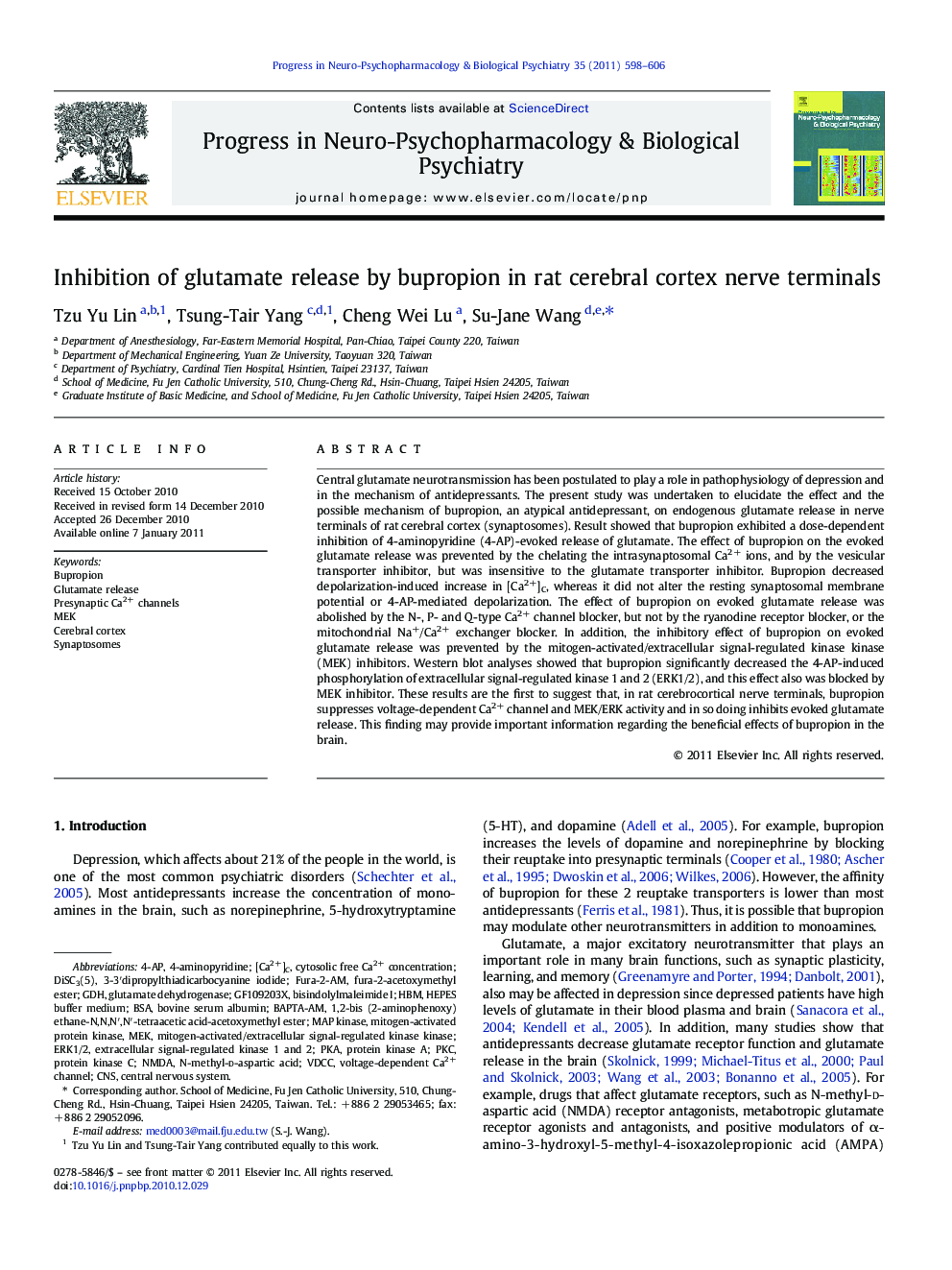| Article ID | Journal | Published Year | Pages | File Type |
|---|---|---|---|---|
| 5845206 | Progress in Neuro-Psychopharmacology and Biological Psychiatry | 2011 | 9 Pages |
Central glutamate neurotransmission has been postulated to play a role in pathophysiology of depression and in the mechanism of antidepressants. The present study was undertaken to elucidate the effect and the possible mechanism of bupropion, an atypical antidepressant, on endogenous glutamate release in nerve terminals of rat cerebral cortex (synaptosomes). Result showed that bupropion exhibited a dose-dependent inhibition of 4-aminopyridine (4-AP)-evoked release of glutamate. The effect of bupropion on the evoked glutamate release was prevented by the chelating the intrasynaptosomal Ca2+ ions, and by the vesicular transporter inhibitor, but was insensitive to the glutamate transporter inhibitor. Bupropion decreased depolarization-induced increase in [Ca2+]C, whereas it did not alter the resting synaptosomal membrane potential or 4-AP-mediated depolarization. The effect of bupropion on evoked glutamate release was abolished by the N-, P- and Q-type Ca2+ channel blocker, but not by the ryanodine receptor blocker, or the mitochondrial Na+/Ca2+ exchanger blocker. In addition, the inhibitory effect of bupropion on evoked glutamate release was prevented by the mitogen-activated/extracellular signal-regulated kinase kinase (MEK) inhibitors. Western blot analyses showed that bupropion significantly decreased the 4-AP-induced phosphorylation of extracellular signal-regulated kinase 1 and 2 (ERK1/2), and this effect also was blocked by MEK inhibitor. These results are the first to suggest that, in rat cerebrocortical nerve terminals, bupropion suppresses voltage-dependent Ca2+ channel and MEK/ERK activity and in so doing inhibits evoked glutamate release. This finding may provide important information regarding the beneficial effects of bupropion in the brain.
Graphical AbstractProposed schema of the mechanism by which bupropion inhibited evoked glutamate release in rat cerebrocortical nerve terminals. In synaptic terminals, the depolarization of neurons induces Ca2+ entry through the N- and P/Q-type VDCCs. Ca2+ influx consequently activates protein kinases and triggers the release of glutamate. In rat cerebrocortical nerve terminals, bupropion effects a decrease in the Ca2+ influx through N- and P/Q-type Ca2+ channels, which subsequently reduces MAP kinase/ERK activity to cause a decrease in evoked glutamate release.Download full-size imageResearch Highlights⺠We examine the effect and possible mechanisms of bupropion, an atypical antidepressant, on glutamate release in rat synaptosomes. ⺠Bupropion rapidly inhibited depolarization-evoked glutamate release. ⺠Bupropion-mediated inhibition of glutamate release involves a decrease in Ca2+ influx through N- and P/Q-type Ca2+ channels, which subsequently reduces mitogen-activated protein kinase (MAPK) activity. ⺠This is the first report of a significant effect of bupropion on the central glutamate system.
